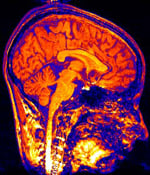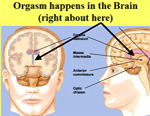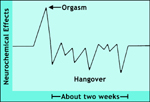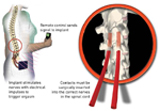 “Financiers take too many risks; scientists do not take enough.” -Seth Roberts
“Financiers take too many risks; scientists do not take enough.” -Seth Roberts
When your appetite changes, your perception changes. Think about how uninviting that fifth slice of pizza is compared with that delectable first slice. Recent brain research is revealing a disturbing phenomenon: intense natural stimuli can interfere with our brain’s normal appetite satiation mechanism. By numbing the pleasure response of the brain, such stimuli can make pleasures less satisfying. The effects linger for weeks. The result is less overall enjoyment and contentment, even though the superstimili continue to register as especially “valuable.”
Could this sneaky primitive mechanism also be at work in our love lives? We can’t say, because it hasn’t been studied.
The early warning signals are coming from research on food. Even in normal, healthy brains, foods that “goose” the brain’s reward circuitry, combined with unlimited access, can produce lingering neurochemical imbalances. The brain’s dopamine-receptor levels drop, promoting “can’t-get-enough” binging. For weeks after the highly stimulating fatty foods are out of the diet, there’s less interest in normal pleasures: “I’m bored with normal chow; where’s my cheesecake?” In another experiment, opioids released during chronic sugar consumption depressed oxytocin neuronal activity. Oxytocin is associated with feelings of satisfaction and termination of consumption. Armed with knowledge like this, food-lovers can choose ‘connoisseur’ over ‘glutton,’ by partaking of especially tempting foods in ways that don’t tamper with their normal sensation of satisfaction.
The brain changes described above occur in the region of the brain that also governs sexual appetite and cravings. Climax intensely stimulates the brain. Dutch scientist Gert Holstege observed, while viewing brain scans of men ejaculating, that the scans reminded him of scans of people shooting heroin. Yet with few exceptions, studies on the neurochemistry of sex terminate shortly after The Big Bang.
There are clues, however, that the actual cycle of orgasm is at least a week in humans, and quite possibly longer. The seven-day cycle showed up in a Chinese study of blood serum hormone levels after ejaculation. Here in the West, animal studies reveal evidence of lingering brain changes after orgasm, and behavioral and hormonal changes that continue for fifteen days.
 As of yet, however, we know virtually nothing about the extended effects of orgasm on human brains—or whether or not climax can ever alter subsequent libido, behavior, perception, pleasure response, or propensity for binging. This lacuna in our knowledge base is regrettable for several reasons.
As of yet, however, we know virtually nothing about the extended effects of orgasm on human brains—or whether or not climax can ever alter subsequent libido, behavior, perception, pleasure response, or propensity for binging. This lacuna in our knowledge base is regrettable for several reasons.
First, the technology now exists for peering into the human brain to measure the dopamine receptor levels associated with the lingering changes described above. So it looks like we could begin to study sex’s effects on the human brain over time using a non-invasive technique. Researchers have already used the new imaging technique to confirm that receptor levels are depleted in drug users and obese patients. (It’s not yet clear whether the low receptor levels are a consequence of behavior, genetics, or both.)
Second, details about the orgasm cycle could potentially make it easier to sustain monogamous contentment. Even though we pair-bonding humans love falling in love, couples are often disillusioned to find that—after a brief neurochemical honeymoon period—their libidos go out of sync or they get bored or disgruntled with each other. It may be that greater knowledge about the effects of sex on the brain could help mates keep the sparkle in their romances, or at least manage this challenge with more grace and compassion.
Third, if orgasm, like fatty food, sometimes temporarily suppresses the brain’s pleasure response and therefore promotes binging, this knowledge would be critical for today’s porn viewers. In The Brain That Changes Itself, psychiatrist Norman Doidge records that some porn-using patients experience distressing (to them) escalation in extremeness of material viewed. They also notice difficulty becoming aroused during sex with their partners. Should we find out whether superstimulating porn is exacerbating natural brain changes after orgasm, numbing responsiveness, increasing erectile dysfunction, and tampering with mood and perception?
Fourth, think of all the other questions we might address: Are there broad gender trends in the orgasm cycle? Would there be best points in the cycle for passionate sex? Best points for sticking to affectionate touch? How would a woman’s menstrual cycle interact with an orgasm cycle? Which benefits of sex come from orgasm, and which from affectionate touch, or…? Are the brain effects of occasional masturbation the same as very frequent masturbation? Does extremeness of stimulation correlate with brain changes? Is there a law of diminishing returns at work in connection with intense stimuli?
So what’s stopping us from peeking into our brains for a week or two after orgasm—just in case something is going on that we should know about?
 To track possible neurochemical changes after orgasm, researchers would need to ask some test subjects to orgasm. Others would have to refrain from orgasm for a couple of weeks—to serve as a control group. Yet Western researchers say they can’t set up the necessary control groups because their ethics committees, which must pre-approve experiments, won’t bless them.
To track possible neurochemical changes after orgasm, researchers would need to ask some test subjects to orgasm. Others would have to refrain from orgasm for a couple of weeks—to serve as a control group. Yet Western researchers say they can’t set up the necessary control groups because their ethics committees, which must pre-approve experiments, won’t bless them.
Despite a lack of evidence that avoiding orgasm for a couple of weeks is harmful to health, one researcher explained that he would hesitate to propose such an experiment because avoiding orgasm has been defined as a “paraphilia” by some experts. Apparently there are people who get off on not getting off—for whom the thought of avoiding orgasm produces intense excitement and elevated dopamine levels. Of course, therapists rarely concern themselves with such atypical behavior unless a person is harming himself/herself or others, and/or is distressed about the behavior. In any case, the screening process would weed out the rare person who avoids orgasm for kicks.
A second researcher confirmed that test subjects avoiding orgasm to participate in an experiment (or for any reason other than seeking jollies) wouldn’t be engaging in a paraphilia. Yet he remained doubtful that Western ethics committees would approve an experiment calling for a week or two of abstinence. Why? “Ethics committees often deny experiments that might cause momentary pain or distress,” he explained. Yet, in this case the control subjects could bail out at will simply by climaxing.
 It’s worth noting that ethics committees have approved risky experiments such as surgically implanting a device in women’s spines to see if they could be made to orgasm via remote control. They have also approved asking subjects not to sleep for days, despite severe distress. Drug abusers regularly volunteer to use dangerous drugs in the lab so scientists can measure the effects on their brains, even though such use could well exacerbate their addictions. Every clinical drug trial on humans risks side effects, and many drugs are later determined to be too dangerous for use as a result.
It’s worth noting that ethics committees have approved risky experiments such as surgically implanting a device in women’s spines to see if they could be made to orgasm via remote control. They have also approved asking subjects not to sleep for days, despite severe distress. Drug abusers regularly volunteer to use dangerous drugs in the lab so scientists can measure the effects on their brains, even though such use could well exacerbate their addictions. Every clinical drug trial on humans risks side effects, and many drugs are later determined to be too dangerous for use as a result.
We know in advance that many experiments are risky for test subjects, but there doesn’t seem to be any evidence that a brief period of abstinence is hazardous. Keep in mind that researchers in Asia have already carried out a study that required subjects to forego orgasm for a couple of weeks.
Why not use our new imaging techniques to check whether we’ve overlooked some of the neurochemical nuances of the orgasm cycle? That way we could be sure that people are getting the most reliable information for managing sexual desire.
So how ‘bout it? Any researchers willing to explain the possible significance of this research to their ethics committees?
Maybe abstenance is the “new” sex of this era. What with so many people unknowingly/knowingly carrying around STD’s who are sexually actually because they take the position that they got “it” from someone and they are going to spread it around without a guilty conscience.
My solution; go out for a run and run as hard for as long as you can. Afterwards ask yourself, was this more exciting than “dangerous” sex.
nor lee that comment made no sense and had very little to do with the content of the article.
once I saw this post say how sex has negative effects I knew it was going to be an anti porn thing. Most guys use porn and are just fine in all ways afterwards. Quit focusing on the few with sexual issues and then saying porn is the problem.
its just dumb to glorify sex. Just masterbate and have sex then move on. The author of this wants use to ritualize sex to the point it actually does interfere with our thinking.
+science+ doesn’t know much .. but that doesn’t mean humans don’t … in many cultures of the world, especially ones in which internal mental practices have been well-established, much is known about this …
daosits, yogis, sufis … and that is just the labels that are easy to use for an uneducated audience ..
and, frankly, scientists who only do research in english concepts are among the least educated in the world, in many areas of human existence …
enjoy, gregory lent
No mention of viagra, et al.?